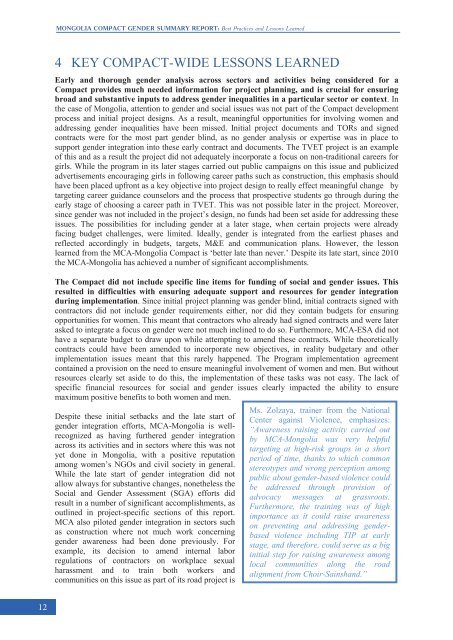Ulaanbaatar 2013
Ulaanbaatar 2013
Ulaanbaatar 2013
Create successful ePaper yourself
Turn your PDF publications into a flip-book with our unique Google optimized e-Paper software.
Mongolia Compact Gender Summary Report: Best Practices And Lessons Learned4 KEY COMPACT-WIDE LESSONS LEARNEDEarly and thorough gender analysis across sectors and activities being considered for aCompact provides much needed information for project planning, and is crucial for ensuringbroad and substantive inputs to address gender inequalities in a particular sector or context. Inthe case of Mongolia, attention to gender and social issues was not part of the Compact developmentprocess and initial project designs. As a result, meaningful opportunities for involving women andaddressing gender inequalities have been missed. Initial project documents and TORs and signedcontracts were for the most part gender blind, as no gender analysis or expertise was in place tosupport gender integration into these early contract and documents. The TVET project is an exampleof this and as a result the project did not adequately incorporate a focus on non-traditional careers forgirls. While the program in its later stages carried out public campaigns on this issue and publicizedadvertisements encouraging girls in following career paths such as construction, this emphasis shouldhave been placed upfront as a key objective into project design to really effect meaningful change bytargeting career guidance counselors and the process that prospective students go through during theearly stage of choosing a career path in TVET. This was not possible later in the project. Moreover,since gender was not included in the project‟s design, no funds had been set aside for addressing theseissues. The possibilities for including gender at a later stage, when certain projects were alreadyfacing budget challenges, were limited. Ideally, gender is integrated from the earliest phases andreflected accordingly in budgets, targets, M&E and communication plans. However, the lessonlearned from the MCA-Mongolia Compact is „better late than never.‟ Despite its late start, since 2010the MCA-Mongolia has achieved a number of significant accomplishments.The Compact did not include specific line items for funding of social and gender issues. Thisresulted in difficulties with ensuring adequate support and resources for gender integrationduring implementation. Since initial project planning was gender blind, initial contracts signed withcontractors did not include gender requirements either, nor did they contain budgets for ensuringopportunities for women. This meant that contractors who already had signed contracts and were laterasked to integrate a focus on gender were not much inclined to do so. Furthermore, MCA-ESA did nothave a separate budget to draw upon while attempting to amend these contracts. While theoreticallycontracts could have been amended to incorporate new objectives, in reality budgetary and otherimplementation issues meant that this rarely happened. The Program implementation agreementcontained a provision on the need to ensure meaningful involvement of women and men. But withoutresources clearly set aside to do this, the implementation of these tasks was not easy. The lack ofspecific financial resources for social and gender issues clearly impacted the ability to ensuremaximum positive benefits to both women and men.Despite these initial setbacks and the late start ofgender integration efforts, MCA-Mongolia is wellrecognizedas having furthered gender integrationacross its activities and in sectors where this was notyet done in Mongolia, with a positive reputationamong women‟s NGOs and civil society in general.While the late start of gender integration did notallow always for substantive changes, nonetheless theSocial and Gender Assessment (SGA) efforts didresult in a number of significant accomplishments, asoutlined in project-specific sections of this report.MCA also piloted gender integration in sectors suchas construction where not much work concerninggender awareness had been done previously. Forexample, its decision to amend internal laborregulations of contractors on workplace sexualharassment and to train both workers andcommunities on this issue as part of its road project isMs. Zolzaya, trainer from the NationalCenter against Violence, emphasizes:“Awareness raising activity carried outby MCA-Mongolia was very helpfultargeting at high-risk groups in a shortperiod of time, thanks to which commonstereotypes and wrong perception amongpublic about gender-based violence couldbe addressed through provision ofadvocacy messages at grassroots.Furthermore, the training was of highimportance as it could raise awarenesson preventing and addressing genderbasedviolence including TIP at earlystage, and therefore, could serve as a biginitial step for raising awareness amonglocal communities along the roadalignment from Choir-Sainshand.”12Page 12 of 80


